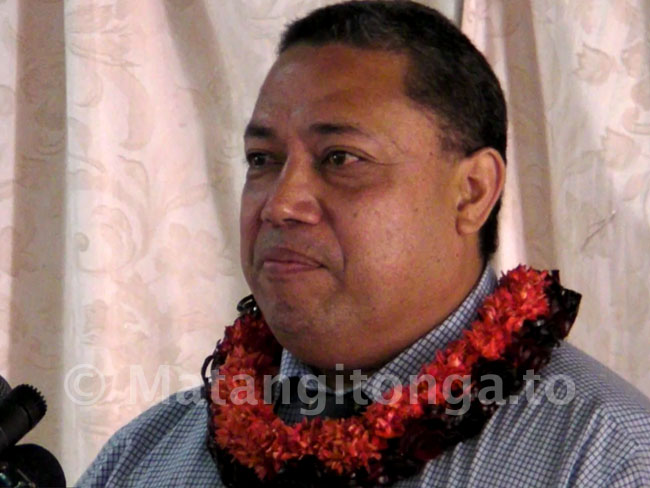By Finau Fonua
Tonga’s Head Psychiatrist Dr Mapa Puloka says family violence is causing mental health problems in Tonga.
“Domestic violence is in some ways similar to incest, it’s a topic that no one wants to talk about….it has come to a point where a lot of Tongans see it as culturally appropriate and tolerate it…we need to talk about it and raise the awareness of the problem,” he said.
Last week Tonga's Director of Health Dr Siale Akau'ola told a Workshop for Reporting Family Violence, held at the Basilica in Nuku'alofa, that many of the perpetrators of family violence have mental health issues.
Dr Puloka, commenting on April 18, explained that family violence is a precipitating factor for mental illness and contributes to many psychological-stress disorders in Tonga.
Big problem
“There’s no doubt that domestic violence is one of the big problems in this country and it is closely related to mental illness, from my experience in the ward it’s a very common thing in Tonga…there are a lot of psycho-stress disorders in Tonga, which I say would include aggressive violence.”
“The usual perpetrators are the husbands…one of most common disorders is an anxiety disorder called Pathological Jealousy, which can cause the husband to become obsessed with his partner…he can commit crimes of passion through manslaughter and murder.”
Dr Puloka explained that family violence is a stress disorder and a form of “Expressed Emotion” that can precipitate someone to cause physical aggression. He also said that Family Violence makes other mental illnesses difficult to control.
“Family violence has been identified as a social-psycho-stress disorder in the family that can precipitate someone to become angry and also to cause physical aggressiveness towards their spouses. Us Tongans think it’s normal and tolerate it, but unconsciously it is some kind of psychological stress disorder that cannot be resolved, and someone who is exposed in early childhood to these things later has some kind of mental health problems in the future.”
“Expressed emotion has also been identified as a main precipitating factor for the relapse of mental illness….If a known patient with some mental illness lives in a particular family where “expressed emotion” is so frequent, there will be a lot of relapses in this person’s illness even if you give them medication. Most of the relapses in mental illnesses are due to family problems at home. There’s no doubt about that.”
Suicides
Dr Puloka added that the ability of children to cope with stress varies and causes them to respond differently to their environment. Those with a weak “resilience” manifest the stresses of their environment more strongly than others.
“People respond differently their environment. There are people who have resilience but others who lack resilience. The severity of the stress can cause suicide. They may take drugs to cope with it. They may be physically aggressive to others and they may cause self-harm to themselves.”
“The age group of suicides is getting younger and younger. Most of them occur in the teen years, which shows there must be problems at home.”
Dr Puloka believes the problem is complicated further by the fact that many Tongans tolerate domestic violence and the lack of communication with children who suffer from severe stress.
“We need to talk about it and raise the awareness of the problem,” he said.
National report

Dr Siale Akau'ola
Tonga's Director of Health Dr Siale 'Akau'ola said on Friday April 12 that many of the perpetrators of family violence have mental health issues.
"We know in Tonga there are a lot of personality traits here and people with poor impulse control.
"We should be aware that you may be stuck with a violent husband but he probably needs some mental treatment, so that you don't keep suffering the same treatment all the time," he said.
According to a National Report in 2009, 45 per cent of women in Tonga reported physical, sexual and emotional violence during their lifetime.
Journalism graduate, Finau Fonua, an intern with Vava'u Press Ltd. (Matangi Tonga Online), won the prize for the most newsworthy article on the consequences of family violence on the health sector in Tonga, in the TNPC-IWD 2013 Journalism Awards.




Comments
'Ihe 'aho 13,14,16,moe 18 'o
'I he 'aho 13, 14, 16, mo e 18 'o 'Epeleli ni pe, 'oku ha 'i he nusipepa ni 'a e ngaahi fakamatala mahu'inga mo'oni ko'eni fekau'aki pea mo hono pau'usi'i 'a e hou'eiki fafine 'i Tonga 'family violence etc'. Koe'uhi ko e ngaahi fakamatala mahu'inga ko'eni meihe kau toketa 'iloa ko'eni, 'iha ki'i vaha'a taimi nounou peheni. Hangehange kuo pulonga 'a Tonga 'i ha fu'u fakapo'ulilolo fekau'aki pea mo hono pa'usi'i 'o e hou'eikifafine 'i Tonga. Ko e anga maheni 'o e fa'ahinga hia ni, na'e fai pe ia 'i he kamata'anga, pea 'oku lolotonga hoko, pea 'e fai pe 'o ta'engata, hange pe ko e ngaahi hia kehe. Ka 'oku 'ikai koha 'uhinga ia ketau sio kehe mei ai. Kuopau ke fa'u 'a e ngaahi polokalama kehekehe ke tokoni'i si'i hou'eiki fafine mo e fanau. 'Oku hu'unga taha pe 'a e ngaahi fakamatalani 'o tukuaki'i 'a hou'eiki tangata, kaehange 'oku haohaoa pe 'a hou'eiki fafine. Koe taha 'o e palopalema 'oku ne uesia lahi taha 'a e nofo mali 'i he kuonga ni, ko e mu'omu'a 'a e totonu 'a e tangata kae toki muimui atu 'a e lotu faka-Kalisitiane. Malo ma'u ongoongo, ka 'oku mau fiema'u ha ngaahi lea 'oku vovo fekau'aki mo Tonga, ke fakaloto'i 'aki ha kau folau'eve'eva mei 'Amelika ni ke nau fie folau atu ki Tonga. SAIA.